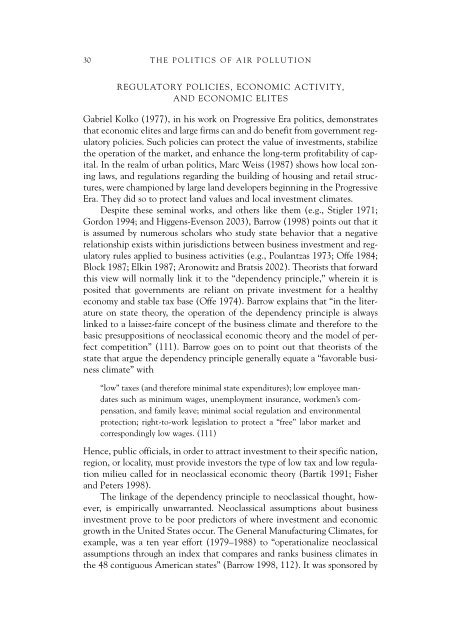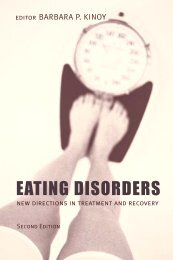THE POLICYMAKING PROCESS 29tions, the Committee for Economic Development, the National Associationof Manufacturers, and the Chamber of Commerce. Overall, policy discussiongroups are the arenas where members of the economic elite cometogether with policy specialists to formulate policy positions, and wheremembers of the economic elite evaluate policy specialists for possible servicein government (Eakins 1972; Domhoff 1978a, 61–87; 2002, chap. 4;Barrow 1993, chap. 1). 7 One example of a policy discussion group is theClean Air Working Group. It was organized by the corporate community inthe 1980s and focuses on the issue of federal clean air regulations (Gonzalez2001a, chap. 6).Certain environmental groups, in terms of their leadership and/orfinancing, have the characteristics of economic elite-led policy-planningorganizations. These groups include the Sierra Club prior to the 1960s, theSave-the-Redwood League, and Environmental Defense. EnvironmentalDefense, for instance, receives significant financing from large foundations,and it has several corporate executives on its board of directors (Dowie 1995,58–59; 2001, 93; Roelofs 2003, 138–139). Susan R. Schrepfer, in her surveyof the Sierra Club’s early charter members, found that approximately onethirdwere academics, and “the rest of them were almost all businessmen andlawyers working in San Francisco’s financial district” (1983, 10; also see Jones1965 and Orsi 1985). The club was founded in 1892. Schrepfer goes on toexplain that businesspeople continued to compose a substantial portion ofthe club’s membership and leadership until the 1960s (1983, 171–173; alsosee Cohen 1988). Unlike the Sierra Club, the high level of economic eliteparticipation on Save-the-Redwood League’s governing council has beenmaintained throughout its history. The closed governance structure of theleague created the “tendency for the council and board to be increasinglydominated by businessmen and patricians, while fewer academics were drawninto the organization’s leadership in the 1950s and 1960s” (1983, 113).Through their financing and participation in such organizations businesspeoplecan gain knowledge and policy proposals on environmental issues. Economicelites can then use this information and these policy proposals in theirefforts to shape public policies on environmental questions when deemednecessary (Gonzalez 2001; 2001b).Economic elite-led policy discussion groups have also been formed forthe purpose of shaping decision-making on the urban level. One prominentexample of such an entity is the National Municipal League (Hays 1964;Domhoff 1978b, 160–169). From the nation-wide effort of this organizationcame the Progressive Era urban reforms of the civil service “to regulate personnelpractices, competitive bidding to control procurement, the city managerform of government to systematize decision making, and at-large electionsto dilute the voting power of the working classes” (Logan and Molotch1987, 152).
30THE POLITICS OF AIR POLLUTIONREGULATORY POLICIES, ECONOMIC ACTIVITY,AND ECONOMIC ELITESGabriel Kolko (1977), in his work on Progressive Era politics, demonstratesthat economic elites and large firms can and do benefit from government regulatorypolicies. Such policies can protect the value of investments, stabilizethe operation of the market, and enhance the long-term profitability of capital.In the realm of urban politics, Marc Weiss (1987) shows how local zoninglaws, and regulations regarding the building of housing and retail structures,were championed by large land developers beginning in the ProgressiveEra. They did so to protect land values and local investment climates.Despite these seminal works, and others like them (e.g., Stigler 1971;Gordon 1994; and Higgens-Evenson 2003), Barrow (1998) points out that itis assumed by numerous scholars who study state behavior that a negativerelationship exists within jurisdictions between business investment and regulatoryrules applied to business activities (e.g., Poulantzas 1973; Offe 1984;Block 1987; Elkin 1987; Aronowitz and Bratsis 2002). Theorists that forwardthis view will normally link it to the “dependency principle,” wherein it isposited that governments are reliant on private investment for a healthyeconomy and stable tax base (Offe 1974). Barrow explains that “in the literatureon state theory, the operation of the dependency principle is alwayslinked to a laissez-faire concept of the business climate and therefore to thebasic presuppositions of neoclassical economic theory and the model of perfectcompetition” (111). Barrow goes on to point out that theorists of thestate that argue the dependency principle generally equate a “favorable businessclimate” with“low” taxes (and therefore minimal state expenditures); low employee mandatessuch as minimum wages, unemployment insurance, workmen’s compensation,and family leave; minimal social regulation and environmentalprotection; right-to-work legislation to protect a “free” labor market andcorrespondingly low wages. (111)Hence, public officials, in order to attract investment to their specific nation,region, or locality, must provide investors the type of low tax and low regulationmilieu called for in neoclassical economic theory (Bartik 1991; Fisherand Peters 1998).The linkage of the dependency principle to neoclassical thought, however,is empirically unwarranted. Neoclassical assumptions about businessinvestment prove to be poor predictors of where investment and economicgrowth in the United States occur. The General Manufacturing Climates, forexample, was a ten year effort (1979–1988) to “operationalize neoclassicalassumptions through an index that compares and ranks business climates inthe 48 contiguous American states” (Barrow 1998, 112). It was sponsored by
- Page 2: The Politics of Air Pollution
- Page 7: ContentsAcknowledgmentsviiONELocal
- Page 12 and 13: LOCAL GROWTH COALITIONS 3tion, such
- Page 14 and 15: LOCAL GROWTH COALITIONS 5how the U.
- Page 16 and 17: LOCAL GROWTH COALITIONS 7growth (Ta
- Page 18 and 19: LOCAL GROWTH COALITIONS 9In this pe
- Page 20 and 21: LOCAL GROWTH COALITIONS 11ity tend
- Page 22 and 23: LOCAL GROWTH COALITIONS 13In the ar
- Page 24 and 25: LOCAL GROWTH COALITIONS 15who reduc
- Page 26 and 27: LOCAL GROWTH COALITIONS 17cally mod
- Page 28 and 29: TWOPolitical Economy and thePolicym
- Page 30 and 31: THE POLICYMAKING PROCESS 21moves to
- Page 32 and 33: THE POLICYMAKING PROCESS 23eral gov
- Page 34 and 35: THE POLICYMAKING PROCESS 25groups
- Page 36 and 37: THE POLICYMAKING PROCESS 27Given in
- Page 40 and 41: THE POLICYMAKING PROCESS 31the Conf
- Page 42: THE POLICYMAKING PROCESS 33lars 199
- Page 45 and 46: 36THE POLITICS OF AIR POLLUTIONCOAL
- Page 47 and 48: 38THE POLITICS OF AIR POLLUTIONa go
- Page 49 and 50: 40THE POLITICS OF AIR POLLUTIONrush
- Page 51 and 52: 42THE POLITICS OF AIR POLLUTIONattr
- Page 53 and 54: 44THE POLITICS OF AIR POLLUTIONScot
- Page 55 and 56: 46THE POLITICS OF AIR POLLUTIONthe
- Page 57 and 58: 48THE POLITICS OF AIR POLLUTIONcrit
- Page 59 and 60: 50THE POLITICS OF AIR POLLUTIONwhen
- Page 61 and 62: 52THE POLITICS OF AIR POLLUTIONin t
- Page 63 and 64: 54THE POLITICS OF AIR POLLUTIONThe
- Page 65 and 66: 56THE POLITICS OF AIR POLLUTIONfirm
- Page 67 and 68: 58THE POLITICS OF AIR POLLUTIONinno
- Page 69 and 70: 60THE POLITICS OF AIR POLLUTIONThe
- Page 71 and 72: 62THE POLITICS OF AIR POLLUTIONFHA
- Page 73 and 74: 64THE POLITICS OF AIR POLLUTIONgone
- Page 75 and 76: 66THE POLITICS OF AIR POLLUTIONPres
- Page 78 and 79: FIVEThe Establishment ofAutomobile
- Page 80 and 81: AUTOMOBILE EMISSION STANDARDS 71ext
- Page 82 and 83: AUTOMOBILE EMISSION STANDARDS 73Ano
- Page 84 and 85: AUTOMOBILE EMISSION STANDARDS 75the
- Page 86 and 87: AUTOMOBILE EMISSION STANDARDS 77thr
- Page 88 and 89:
AUTOMOBILE EMISSION STANDARDS 79was
- Page 90 and 91:
AUTOMOBILE EMISSION STANDARDS 81exp
- Page 92 and 93:
AUTOMOBILE EMISSION STANDARDS 83acc
- Page 94 and 95:
AUTOMOBILE EMISSION STANDARDS 85Thu
- Page 96 and 97:
AUTOMOBILE EMISSION STANDARDS 87A n
- Page 98 and 99:
SIXDemocratic Ethics,Environmental
- Page 100 and 101:
DEMOCRATIC ETHICS 91At the core of
- Page 102 and 103:
DEMOCRATIC ETHICS 93senior attorney
- Page 104 and 105:
DEMOCRATIC ETHICS 95ments mount cha
- Page 106 and 107:
DEMOCRATIC ETHICS 97frameworks, as
- Page 108 and 109:
DEMOCRATIC ETHICS 99mobiles and gas
- Page 110 and 111:
DEMOCRATIC ETHICS 101the ecological
- Page 112 and 113:
CONCLUSIONPolitical Power andGlobal
- Page 114 and 115:
CONCLUSION 105quality became manife
- Page 116:
CONCLUSION 107lation, the U.S. econ
- Page 119 and 120:
110THE POLITICS OF AIR POLLUTIONCHA
- Page 121 and 122:
112THE POLITICS OF AIR POLLUTION6.
- Page 123 and 124:
114THE POLITICS OF AIR POLLUTION4.
- Page 126 and 127:
BibliographyAcher, Robin. 2001. “
- Page 128 and 129:
BIBLIOGRAPHY 119Brienes, Marvin. 19
- Page 130 and 131:
BIBLIOGRAPHY 121Cole, Luke W., and
- Page 132 and 133:
BIBLIOGRAPHY 123——— . 2002. W
- Page 134 and 135:
BIBLIOGRAPHY 125——— . 1975.
- Page 136 and 137:
BIBLIOGRAPHY 127Hayward, Clarissa R
- Page 138 and 139:
BIBLIOGRAPHY 129——— . 2001. E
- Page 140 and 141:
BIBLIOGRAPHY 131——— . 1988.
- Page 142 and 143:
BIBLIOGRAPHY 133Perez-Pena, Richard
- Page 144 and 145:
BIBLIOGRAPHY 135Runte, Alfred. 1997
- Page 146 and 147:
BIBLIOGRAPHY 137Tarr, Joel A. 1996.
- Page 148:
BIBLIOGRAPHY 139Wiewel, Wim, and Jo
- Page 151 and 152:
142THE POLITICS OF AIR POLLUTIONChi
- Page 153:
144THE POLITICS OF AIR POLLUTIONTuc









